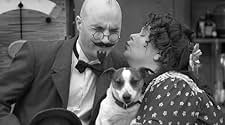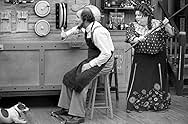A scientist & inventor in 1907, Dr Plonk, predicts that the world will end in 101 years, unless something is done about it. A comedy in the Charlie Chaplin / Buster Keaton tradition.A scientist & inventor in 1907, Dr Plonk, predicts that the world will end in 101 years, unless something is done about it. A comedy in the Charlie Chaplin / Buster Keaton tradition.A scientist & inventor in 1907, Dr Plonk, predicts that the world will end in 101 years, unless something is done about it. A comedy in the Charlie Chaplin / Buster Keaton tradition.
- Awards
- 1 win & 1 nomination
Photos
Nigel Martin
- Dr. Plonk
- (as Nigel Lunghi)
Jo Kennedy
- Park Bench Woman
- (as Joey Kennedy)
Josh Jaeger
- Botanic Gardens Policeman
- (as Joshua Jaeger)
- Director
- Writer
- All cast & crew
- Production, box office & more at IMDbPro
Storyline
Did you know
- TriviaThe film was born when director Rolf de Heer opened his office refrigerator door and saw 20,000 feet of unexposed film stock. This is when the idea came to him to make a silent film and he knew then what his team were going to do next.
- ConnectionsFeatured in Making 'Dr Plonk' (2008)
Featured review
Rolf de Heer, in introducing Dr. Plonk, explained that there were at least three reasons he made this film:
* He found the stock in a fridge going to waste, and decided to use it. When I asked him about it later, he said it was about ten years past its expiry date. It was colour film that was converted to black and white in post-production.
* He wanted to make a film that was a tribute to the films he loved in his childhood, such as The Keystone Kops.
* After the difficulties of some of his earlier films, he wanted to make something that would be fun to make and fun for the actors to be involved in. As an aside, he mentioned that it was much more difficult than expected.
While I live in hope for Australian films, I can't say that I'm a big fan of much of our output. Rolf de Heer is an Australian director whose work does interests me. I've only seen three of them, but each was completely different:
* The Old Man Who Read Loves Stories (2001). I saw this in 2004 at the Nova cinema, with a Q&A session with the director. De Heer described some of the many problems he had making this film with an international cast in the jungles of French Guiana. Starring Richard Dreyfuss, Timothy Spall and Hugo Weaving, it was both an unusual and an interestingly different film.
* Ten Canoes (2006). This is a really unique Australian film that tells an indigenous story in a way that these people voiced so publicly. It won the Un certain regard (Special Jury prize) at Cannes 2006 as well as 6 AFI awards (for best film, director, screenplay, cinematography, editing and sound). It was also my no.3 favourite film for 2006 (after Em 4 Jay and The King).
* Dr. Plonk
I was pleasantly surprised by Dr. Plonk. At first glance, the images promoting the film looked somewhat cringe-worthy. I was also a little skeptical at the idea of reproducing the silent-era style in a contemporary film.
De Heer told me that when he presented the film to a group of school children in Adelaide, the general consensus was positive, even though most of them didn't understand the concept of silent film. One student asked why no-one was talking. I think this is excellent family entertainment. Often the word 'family' is used in conjunction with children's films, but I mean it in the context of 'all-ages'. Baby-boomers and older will relate to the obvious homage to The Keystone Kops (which I also enjoyed as a child) and the early films of Buster Keaton and Charlie Chaplin.
De Heer has done a remarkable job of producing a contemporary film that is not only a faithful reproduction of the style and mood of these historic films (including classic slapstick, stunts and acrobatics), but also manages to fuse contemporary issues. Set in 1907, Dr. Plonk creates a time machine that travels 100 years into the future in order to gather proof that the world will indeed end in 2008. De Heer displays excellent judgement in subtly presenting political points in a way that doesn't detract from the mood of the film or offend people's sensibilities.
The casting was spot on. The three main characters were Dr. Plonk (Nigel Lunghi), his lowly assistant Paulus (played as comic relief by Paul Blackwell) and Mrs. Plonk (the always funny Magda Szubanski). South Australian premier Mike Rann appears in a cameo role as the present day Prime Minister Short, and Wayne Anthoney plays Prime Minister Stalk in 1907. The film also takes a humorous look at who our next prime minister will be.
Some of the classic devices of silent films used by de Heer include: humiliation of a superior towards his subordinate, lots of bum-kicking, a performing animal, altered film speed, a slight flickering look to the film as the light intensity varies (emulating the imperfections of the technique of the day) and absurdly simple devices (like a wooden box with a lever as the time machine).
There's a point around half way into the film where if gets a little flat, and I suspect some contemporary audiences - particularly those with little experience of silent film - may get a little bored. Having recently seen some Keaton shorts at Melbourne Cinémathèque, as well as Keaton's The General at the Astor a year or so ago, I thought this was still consistent with the films of that era. The music was enjoyable and appropriate, yet a little whacky - it was performed by the Stiletto Sisters.
All in all, I found the film a real treat, well conceived and executed. I intend taking my six year old son to see it and I'm sure he'll be laughing his head off at the good old-fashioned gags that leave most modern comedies for dead. This film is 83 minutes of refreshingly good old-fashioned entertainment.
* He found the stock in a fridge going to waste, and decided to use it. When I asked him about it later, he said it was about ten years past its expiry date. It was colour film that was converted to black and white in post-production.
* He wanted to make a film that was a tribute to the films he loved in his childhood, such as The Keystone Kops.
* After the difficulties of some of his earlier films, he wanted to make something that would be fun to make and fun for the actors to be involved in. As an aside, he mentioned that it was much more difficult than expected.
While I live in hope for Australian films, I can't say that I'm a big fan of much of our output. Rolf de Heer is an Australian director whose work does interests me. I've only seen three of them, but each was completely different:
* The Old Man Who Read Loves Stories (2001). I saw this in 2004 at the Nova cinema, with a Q&A session with the director. De Heer described some of the many problems he had making this film with an international cast in the jungles of French Guiana. Starring Richard Dreyfuss, Timothy Spall and Hugo Weaving, it was both an unusual and an interestingly different film.
* Ten Canoes (2006). This is a really unique Australian film that tells an indigenous story in a way that these people voiced so publicly. It won the Un certain regard (Special Jury prize) at Cannes 2006 as well as 6 AFI awards (for best film, director, screenplay, cinematography, editing and sound). It was also my no.3 favourite film for 2006 (after Em 4 Jay and The King).
* Dr. Plonk
I was pleasantly surprised by Dr. Plonk. At first glance, the images promoting the film looked somewhat cringe-worthy. I was also a little skeptical at the idea of reproducing the silent-era style in a contemporary film.
De Heer told me that when he presented the film to a group of school children in Adelaide, the general consensus was positive, even though most of them didn't understand the concept of silent film. One student asked why no-one was talking. I think this is excellent family entertainment. Often the word 'family' is used in conjunction with children's films, but I mean it in the context of 'all-ages'. Baby-boomers and older will relate to the obvious homage to The Keystone Kops (which I also enjoyed as a child) and the early films of Buster Keaton and Charlie Chaplin.
De Heer has done a remarkable job of producing a contemporary film that is not only a faithful reproduction of the style and mood of these historic films (including classic slapstick, stunts and acrobatics), but also manages to fuse contemporary issues. Set in 1907, Dr. Plonk creates a time machine that travels 100 years into the future in order to gather proof that the world will indeed end in 2008. De Heer displays excellent judgement in subtly presenting political points in a way that doesn't detract from the mood of the film or offend people's sensibilities.
The casting was spot on. The three main characters were Dr. Plonk (Nigel Lunghi), his lowly assistant Paulus (played as comic relief by Paul Blackwell) and Mrs. Plonk (the always funny Magda Szubanski). South Australian premier Mike Rann appears in a cameo role as the present day Prime Minister Short, and Wayne Anthoney plays Prime Minister Stalk in 1907. The film also takes a humorous look at who our next prime minister will be.
Some of the classic devices of silent films used by de Heer include: humiliation of a superior towards his subordinate, lots of bum-kicking, a performing animal, altered film speed, a slight flickering look to the film as the light intensity varies (emulating the imperfections of the technique of the day) and absurdly simple devices (like a wooden box with a lever as the time machine).
There's a point around half way into the film where if gets a little flat, and I suspect some contemporary audiences - particularly those with little experience of silent film - may get a little bored. Having recently seen some Keaton shorts at Melbourne Cinémathèque, as well as Keaton's The General at the Astor a year or so ago, I thought this was still consistent with the films of that era. The music was enjoyable and appropriate, yet a little whacky - it was performed by the Stiletto Sisters.
All in all, I found the film a real treat, well conceived and executed. I intend taking my six year old son to see it and I'm sure he'll be laughing his head off at the good old-fashioned gags that leave most modern comedies for dead. This film is 83 minutes of refreshingly good old-fashioned entertainment.
- paulmartin-2
- Aug 20, 2007
- Permalink
Details
- Release date
- Country of origin
- Official sites
- Language
- Also known as
- Doctor Plonk
- Filming locations
- Production company
- See more company credits at IMDbPro
Box office
- Gross worldwide
- $89,509
- Runtime1 hour 25 minutes
- Color
- Sound mix
- Aspect ratio
- 1.37 : 1
Contribute to this page
Suggest an edit or add missing content



















